Therapeutic Gardens | The ecological garden of the Trébol Foundation
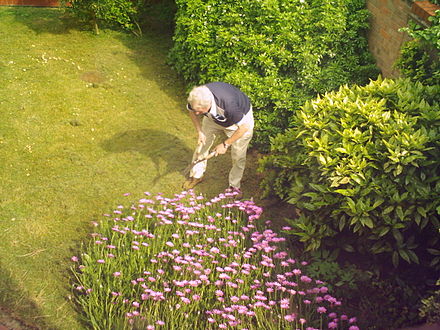
Hello everyone! I bring you the continuation of the article “ Agrohuerto visits the Fundación Trébol ”, in which I presented you a little about how the Foundation worked and the different centers where the boys were closely linked to agriculture and gardening. Well, in this case I am going to focus on a very important part of the School of Gardening that I introduced in the previous article: the Organic Garden.
Benefits of the therapeutic garden for people with intellectual disabilities
Horticulture, in therapy and rehabilitation programs professionally directed by horticultural therapists, becomes a very useful tool to achieve the physical and mental well-being of its participants.
This ecological garden of the Trébol Foundation would be halfway between a school garden, since it belongs to the Foundation’s gardening school and serves as a learning tool for students, and a therapeutic garden, since its participants are people with intellectual disabilities. to whom the garden activities also provide numerous benefits.
In its therapeutic function, contact with the plants in the garden stimulates mobility, attention span and the will to improve. On the other hand, healthy eating and living habits are favored, with the subsequent use of garden products, and it allows the learning of basic skills in such a way that it improves physical and cognitive functioning. In addition, it serves as job orientation, since the center is also committed to integration in this area and is a tool for, in addition to acquiring specific knowledge of horticulture, promoting responsibility towards the task and promoting autonomous work.
The therapeutic garden of the Trébol Foundation
This orchard began to be prepared last year in an area of about 1,000 square meters. Despite the fact that the soil is very poor and complicated for cultivation, the result was very good considering that it was the first harvest, since they obtained more than 2,000 kilos of horticultural products and, above all, a lot of joy and satisfaction. The biggest problem at that time was neither the pests nor the frost, but rather the outlet for those delicious products grown with so much love. Fortunately, this year some firms such as Fundación MAPFRE at its headquarters in Majadahonda, Hewlett-Packard in Las Matas, Verdecora in Majadahonda or CTM (Madrid Transport Center), have shown solidarity with the cause, and have enabled a space for the sale of products, where the students themselves have actively supported the tasks of selling flowers, plants and organic horticultural products. The funds raised have been used entirely for the social purposes of the entity, mainly in the area of the school.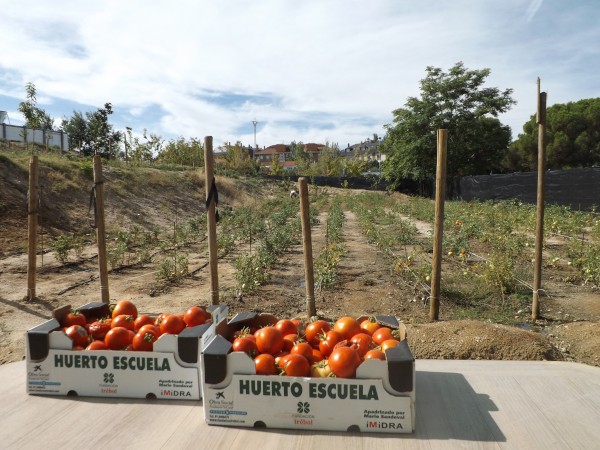
The agronomic work of the Garden
As in the rest of the Foundation’s activities, in the organic garden they also have the collaboration of different entities. Thus, many of the seedlings they use come from donations from IMIDRA (Madrid Institute for Rural, Agrarian and Food Research and Development), which is why most of the varieties grown are native, thus favoring their conservation.
Among the crops that grow in the garden we find a wide variety: white zucchini, aubergine, tomato, cherry tomato, padrón peppers, potatoes, lettuce, chard, etc.
To fertilize such poor soil, they use horse manure that they get from a nearby Equestrian Club and compost that they make themselves in the compost bin.
In order to keep pests at bay, they have planted different types of aromatic plants at the beginning of the crop lines. They also use pheromone sticky ramps to monitor lepidoptera pests, such as Heliothis, with which they had occasional problems.
Fungi, such as powdery mildew and mildew, as well as mites , are treated with sulfur. To drive away the ants, they reuse the coffee capsule grounds that the boys at the occupational center use to make crafts.
Other activities in the garden
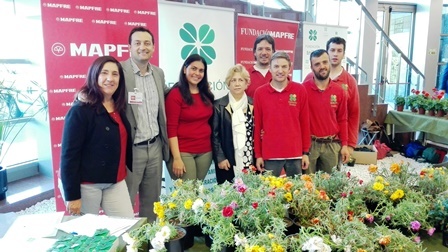
Currently, in addition to the horticultural tasks of the organic garden that the students learn, social awareness activities are also carried out with different groups, from Schools, such as CEIP San Miguel de las Rozas, to international firms such as KPMG. In both cases, the students were the «teachers» in charge of teaching what they knew about agriculture to both the youngest in the school and the group of senior managers, who came from different countries. An experience for both parties…
Finally, I would like to thank the members of the Foundation who welcomed us with open arms during our visit. It’s all of my part. If you want to learn more about the foundation, you can go to their website or even visit them, they will be delighted to welcome you! Until next time!

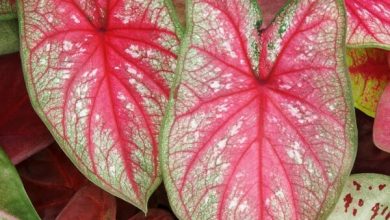
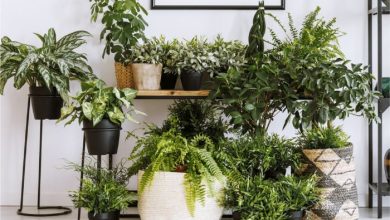
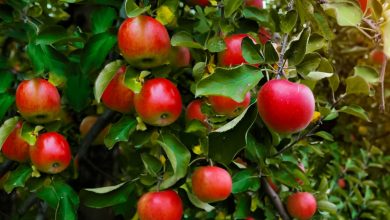
![Photo of Actinomycetes: [Characteristics, Development, Functions and Diseases]](https://www.complete-gardening.com/wp-content/uploads/2022/08/actinomycetes-characteristics-development-functions-and-diseases-390x220.png)